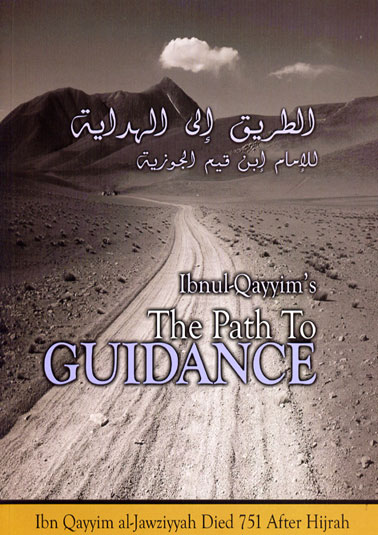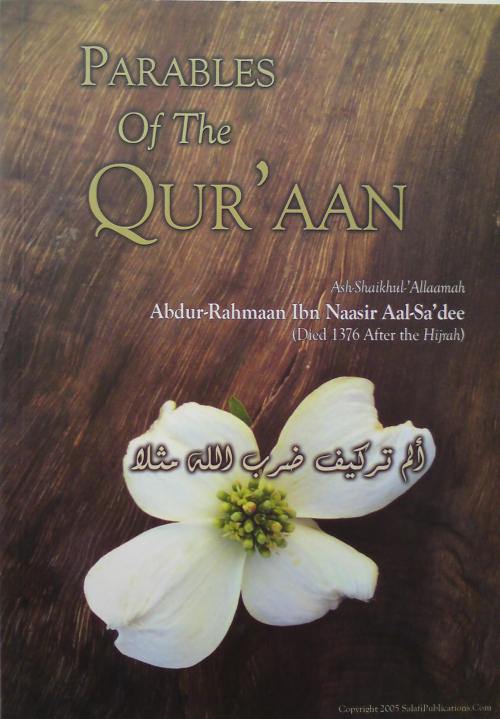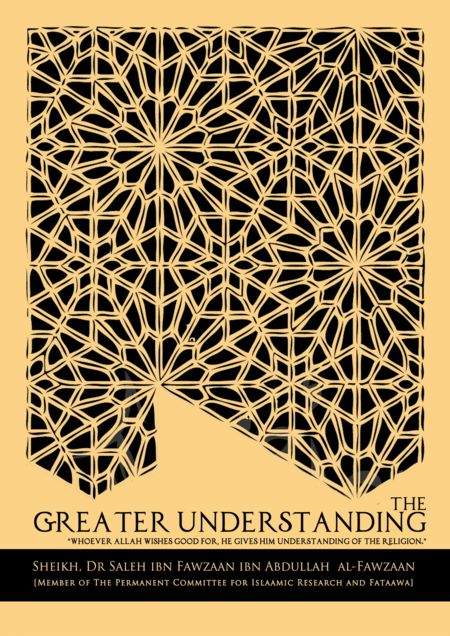
Info about book (132 pages) from back cover:
Ibn al-Qayyim said, “Get up (and hurry) in entering upon Allaah and accompanying Him in the Home of Peace, without any tiredness, hardship or fatigue, but in fact by the nearest of paths and the most easiest (of them). And this is (by realising) that you are in a time between two times which is (what constitutes) your life, and this is the present time which is between what has passed and what is yet to come. Then that which has passed, you can correct by repentance, remorse and seeking forgiveness. This is something in which there will be no tiredness, fatigue, or any straining efforts (required on your behalf). It is (nothing but) the action of the heart … And there is due from the servant to Allaah, in every moment from his time, servitude which will advance him or bring him nearer to Allaah. So if he spends his time in servitude to Allaah, he will advance to His Lord and if he busies himself with desires, or relaxation or inactivity, he will lag behind. And the servant never ceases either to be moving forward or falling behind, and there is no stopping whilst on the path, ever.”
Every harm that enters upon a servant, is caused by the heart’s corruption. The corruption of the heart in turn brings about the removal of the heart’s right upon Allaah, the Exalted, and a dimunition of its degree and rank in the sight of Allaah. For this reason, some of the shaikhs advised with their saying, “Be cautious of (the) mixing with a person which will cause wastage of time and corruption of the heart. For verily, when time is wasted and the heart is corrupted, all of the affairs of the servant will become ruined…” How can it befit the intelligent person that he should waste and neglect it (i.e., his soul), and to sell it for an insignificant price, in a ceasing, wasting, perishing place. Is this but the greatest of frauds? This senseless and foolish fraud will become manifest on the Day of Resurrection, when the scales of those having taqwaa of Allaah will be heavy (with good deeds) and the scales of the falsifiers will be light (devoid of good deeds).
The Ways of Attaining Knowledge
And the beneficial knowledge has certain ways and means by which it is obtained and certain paths that are taken in its acquisition and memorisation. Amongst the most important of them are:
Firstly: That the servant asks his Lord for the beneficial knowledge and that he seeks assistance by Him, the Exalted, and shows his need to Him. Allaah ordered His Prophet, Muhammad (صلى الله عليه وسلم) to ask Him that He increases him in knowledge, in addition to his knowledge. He, the Exalted said:
And say, “O Lord! Increase me in knowledge.”1
And the Messenger (صلى الله عليه وسلم) used to say, “O Allaah, benefit me with what you have taught me and teach me that which will benefit me and increase me in knowledge.”2
Secondly: And this is the greatest and the essence of them all – sincerity in seeking knowledge. The Messenger (صلى الله عليه وسلم) said, “Whoever learnt knowledge by which the Face of Allaah is to be sought, but does not do so except for attaining a goal of this world, (he) will not smell the fragrance of Paradise on the Day of Resurrection.” 3
Thirdly: Striving and exerting oneself in seeking knowledge, having keen interest for it, having a true desire in which the Pleasure of Allaah, the Most High, is sought and adopting all of the ways and means in seeking knowledge of the Book and the Sunnah.4
A man came to Aboo Hurairah (رضي الله عنه) and said, “I desire to learn the knowledge but I fear that I may waste it.” So Aboo Hurairah replied to him, “Your abandonment of learning it is sufficient in wasting it.”5 For this reason one of the wise people, upon being asked, “What is the way by which knowledge is obtained?” answered, “With eagerness is it followed, with love is it listened to, with sole concern is it gathered, teach your knowledge to the one who is ignorant, and learn from the one who teaches, for if you do that, you will come to know that of which you were ignorant and you will memorise that which you (yourself) have learnt.”6
For this reason, Imaam ash-Shaafi’ee (rahimahullah) said:
“My brother! You will not acquire knowledge
except by six matters,
I will inform you of their detail with an explanation:
Intelligence, zeal, striving, competence/proficiency
The companionship of a teacher…
and a long time!”
Fourthly: Avoiding all disobedience by having taqwaa of Allaah, the Most High, for that is the greatest of means of acquiring knowledge, as He, the Most High, has said:
Have taqwaa of Allaah and Allaah will teach you, and Allaah has knowledge of every single thing.7
And He, the Most High, also said:
O you who believe! If you have taqwaa of Allaah, He will grant you a criterion (to judge between truth and falsehood).8
This is clear and manifest proof that the one who has taqwaa of Allaah, He will grant him knowledge by which he will distinguish between truth and falsehood. For this reason ‘Abdullah ibn Mas’ood (رضي الله عنه) said, “Indeed, I consider that man loses knowledge which he once had, due to a sin which he committed.”9
Imaam ash-Shafi’ee (rahimahullah) said, “I complained to Wakee’ about the poorness of my memory. So he directed me to abandon disobedience. And informed me that the knowledge of Allaah is light. And that the light of Allaah is not given to the disobedient.”10 Imaam Maalik said to Imaam ash-Shaafi’ee (rahimahullah), “I see that Allaah has placed light in your heart so not extinguish it with the darkness of disobedience.”11
Fifthly: Being neither shy nor arrogant in seeking knowledge, and this is why ‘Aa’ishah, may Allaah be pleased with her, said, “How excellent are the women of the Ansaar, shyness/modesty does not prevent them from understanding the religion.”12 Umm Sulaim, may Allaah be pleased with her, said, “O Messenger of Allaah! Allaah is not ashamed of the truth, so is it necessary for a women to make ghusl when she has a wet dream?” The Prophet (صلى الله عليه وسلم) said, “If she sees the fluid.”13 Mujaahid said, “The shy person and the arrogant one will not learn the knowledge.”14
And finally: Acting upon the knowledge. The Messenger of Allaah (صلى الله عليه وسلم) said, “A servants two feet will not move on the Day of Judgement until he is questioned about four (things). His youth – how he spent it; his knowledge – how he acted upon it; his wealth – how he earned it and how he spent it and his body – how he used/wasted it.”15 He (صلى الله عليه وسلم) also said, “A man will be brought on the Day of Judgement and will be thrown in the Fire and his entrails will pour out. It will be said, ‘Did you not used to order the good and forbid the evil?’ He will say, ‘I used to command you with good and not do it myself and I used to forbid you from evil and do it myself.’ “16
Footnotes
1 Soorah Taa Haa (21):114.
2 Reported by at-Tirmidhee (5/578) and Ibn Maajah (1/92). Also refer to Saheeh Ibn Maajah (1/47).
3 Reported by Aboo Dawood with his wording in Kitaabul-‘Ilm and Ibn Maajah in his introduction (1/93). Refer also to Saheeh Ibn Maajah (1/48).
4 Such as buying books and casettes, connecting with the people of knowledge from Ahlus-Sunnah, not Ahlul-Bid’ah, attending their gatherings, talks and conferences, travelling for the sake of knowledge and other such efforts. Refer to Chapter Eleven: The Methodology of a Muslim.
5 Refer to Tafseerus-Sa’dee (5/194).
6 Jaami’ Bayaanul-‘Ilm wa Fadlihi of Ibn ‘Abdul-Barr (1/102,103).
7 Soorah al-Baqarah (2):282.
8 Soorah al-Anfaal (8):29.
9 Jaami’ Bayaanul-‘Ilm wa Fadlihi of Ibn ‘Abdul-Barr (1/196).
10 Deewaanush-Shaafi’ee (p. 88). Refer also to Al-Jawaab al-Kaafee of Ibn al-Qayyim (p. 104).
11 Al-Jawaab al-Kaafee of Ibn al-Qayyim (p. 104).
12 Reported by Bukhaaree in Kitaabul-‘Ilm.
13 Ibid.
14 Ibid.
15 Reported by at-Tirmidhee (2417) and see Saheehut-Targheeb wat-Tarheeb (1/126).
16 Reported by Bukhaaree (3094) and Muslim (2989).
Source: The Path to Guidance, Imaam Ibn Al-Qayyim Al-Jawziyyah (died 751 AH), Translated by Aboo ‘Iyaad Amjad Rafiq, Salafi Publications, First Edition, pp.51-55.








